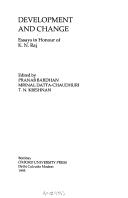Book
ISBN: 0195080491 9780195080490 Year: 1993 Publisher: New York Oxford University Press
Abstract | Keywords | Export | Availability | Bookmark
 Loading...
Loading...Choose an application
- Reference Manager
- EndNote
- RefWorks (Direct export to RefWorks)
Capitalism --- Capitalisme --- Capitalisme monopoliste d'État --- Economie [Gemengde ] --- Economie mixte --- Gemengde economie --- Kapitalisme --- Marché [Économie de ] --- Market economy --- Markteconomie --- Marxism --- Mixed economy --- Régime capitaliste --- Social democracy --- Socialism --- Socialisme --- Socialist movements --- Système capitaliste --- Économie capitaliste --- Économie de marché --- Économie libérale --- Mixed economy. --- Socialism. --- Capitalism. --- 330.342 --- Economics --- Profit --- Capital --- Collectivism --- Anarchism --- Communism --- Critical theory --- Economy, Mixed --- Third way (Economics) --- Economische ontwikkeling. Groeistadia --- SocialismEconomische ontwikkeling. Groeistadia --- 330.342 Economische ontwikkeling. Groeistadia
Book
Year: 2003 Publisher: Namur : FUNDP. Faculté des sciences économiques, sociales et de gestion,
Abstract | Keywords | Export | Availability | Bookmark
 Loading...
Loading...Choose an application
- Reference Manager
- EndNote
- RefWorks (Direct export to RefWorks)
Book
Year: 2003 Publisher: Namur : FUNDP. Faculté des sciences économiques, sociales et de gestion,
Abstract | Keywords | Export | Availability | Bookmark
 Loading...
Loading...Choose an application
- Reference Manager
- EndNote
- RefWorks (Direct export to RefWorks)
Book
ISBN: 0231062249 Year: 1988 Publisher: New York (N.Y.): Columbia university press
Abstract | Keywords | Export | Availability | Bookmark
 Loading...
Loading...Choose an application
- Reference Manager
- EndNote
- RefWorks (Direct export to RefWorks)
Rural poor --- Rural poor --- India --- South Asia --- Rural conditions. --- Rural conditions.
Book
ISBN: 9264255591 9789264255593 Year: 1997 Volume: 97
Abstract | Keywords | Export | Availability | Bookmark
 Loading...
Loading...Choose an application
- Reference Manager
- EndNote
- RefWorks (Direct export to RefWorks)
Political corruption --- Decentralization in government --- Corruption (Politique) --- Décentralisation administrative --- Developing countries --- Pays en développement --- Economic conditions --- Ethnic relations --- Conditions économiques --- Relations interethniques --- Corruption --- Decentralisation administrative --- Aspect economique --- Décentralisation administrative --- Pays en développement --- Conditions économiques --- Corruption - Aspect economique - Pays en voie de developpement. --- Decentralisation administrative - Aspect economique - Pays en voie de developpement
Book
Year: 2006 Publisher: New York : Princeton University Press,
Abstract | Keywords | Export | Availability | Bookmark
 Loading...
Loading...Choose an application
- Reference Manager
- EndNote
- RefWorks (Direct export to RefWorks)
Can the welfare state survive in an economically integrated world? Many have argued that globalization has undermined national policies to raise the living standards and enhance the economic opportunities of the poor. This book, by sixteen of the world's leading authorities in international economics and the welfare state, suggests a surprisingly different set of consequences: Globalization does not preclude social insurance and egalitarian redistribution--but it does change the mix of policies that can accomplish these ends. Globalization and Egalitarian Redistribution demonstrates that the free flow of goods, capital, and labor has increased the inequality or volatility of labor earnings in advanced industrial societies--while constraining governments' ability to tax the winners from globalization to compensate workers for their loss. This flow has meanwhile created opportunities for enhancing the welfare of the less well off in poor and middle-income countries. Comprising eleven essays framed by the editors' introduction and conclusion, this book represents the first systematic look at how globalization affects policies aimed at reducing inequalities. The contributors are Keith Banting, Pranab Bardhan, Carles Boix, Samuel Bowles, Minsik Choi, Richard Johnston, Covadonga Meseguer Yebra, Karl Ove Moene, Layna Mosley, Claus Offe, Ugo Pagano, Adam Przeworski, Kenneth Scheve, Matthew J. Slaughter, Stuart Soroka, and Michael Wallerstein.
Globalització --- Igualtat. --- Distribució de la renda. --- Economia internacional --- Aspectes socials. --- Argentina. --- Bardhan, Pranab. --- Betz, Hans-Georg. --- Boix, Carles. --- Bowles, Samuel. --- Cameron, David R. --- Chile. --- Colombia. --- Denmark. --- Domar, Evsey. --- European Union (EU). --- Feenstra, Robert C. --- Freeman, Richard B. --- Garrett, Geoffrey. --- Gellner, Ernest. --- Hanson, Gordon H. --- Huber, Evelyne. --- Johnson, George. --- Keynes, John Maynard. --- Meseguer, Covadonga. --- area-analysis model. --- capital mobility. --- embeddedness. --- globalization. --- government expenditures. --- immigration. --- industrial conflict. --- interest rate spread. --- labor. --- nationalism. --- open economy. --- policies. --- protectionism. --- social insurance. --- tariffs.

ISBN: 0195631226 Year: 1993 Publisher: Bombay ; Delhi ; Calcutta Oxford University Press
Abstract | Keywords | Export | Availability | Bookmark
 Loading...
Loading...Choose an application
- Reference Manager
- EndNote
- RefWorks (Direct export to RefWorks)
Article
Year: 2003 Publisher: Namur : Facultés universitaires Notre-Dame de la Paix [= FUNDP, Namur], faculté des sciences économiques et sociales,
Abstract | Keywords | Export | Availability | Bookmark
 Loading...
Loading...Choose an application
- Reference Manager
- EndNote
- RefWorks (Direct export to RefWorks)
Book
ISBN: 0691077606 Year: 1988 Publisher: Princeton (N.J.) : Princeton university press,
Abstract | Keywords | Export | Availability | Bookmark
 Loading...
Loading...Choose an application
- Reference Manager
- EndNote
- RefWorks (Direct export to RefWorks)
Democracy --- Representative government and representation --- Congresses. --- Congresses.
Book

Year: 2003 Publisher: Namur Facultés universitaires Notre-Dame de la Paix
Abstract | Keywords | Export | Availability | Bookmark
 Loading...
Loading...Choose an application
- Reference Manager
- EndNote
- RefWorks (Direct export to RefWorks)

 Search
Search Feedback
Feedback About UniCat
About UniCat  Help
Help News
News